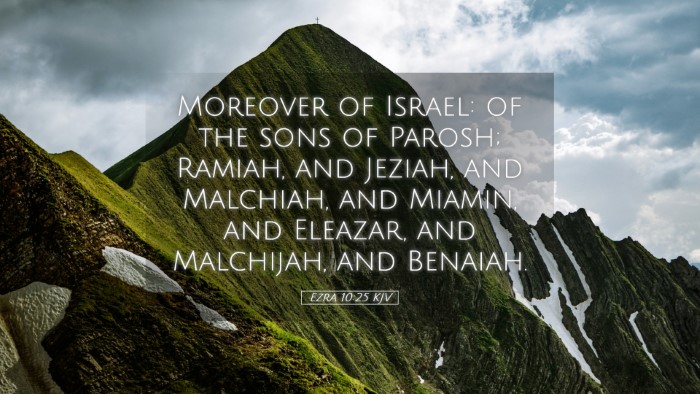Commentary on Ezra 10:25
Ezra 10:25 captures a crucial moment in the history of the Israelite people as they confront the implications of their actions upon returning from Babylonian exile. The verse reads:
"And of Israel's sons, there were: of the sons of Parosh, Ramiah; of the sons of Zattu, Azariah; of the sons of Elam, Shephatiah; of the sons of Zattu, Eliezer."
Historical Context
The context of Ezra 10 is significant, marking a point of repentance and reformation among the returned exiles. They had intermarried with the foreign peoples around them, which was in direct violation of the Law of Moses. Such actions jeopardized their distinct identity as the covenant people of God.
Key Themes
- Repentance: The chapter emphasizes the importance of repentance, as the people recognize their sins and take collective action to rectify their wrongs.
- Restoration: The verse underlines the theme of restoration, where the community seeks to return to a faithful relationship with God.
- Covenant Faithfulness: The listings of names illustrate the seriousness with which the community considers its covenant obligations, reminding leaders and congregants of their duty to holiness.
Insights from Commentaries
Matthew Henry
Matthew Henry offers illuminating insights into the nature of repentance as depicted in Ezra 10. He emphasizes the weight of collective responsibility in communal sin and the willingness to confront difficult truths. Henry highlights that the names listed in this verse serve not only as a record of those who participated in wrongdoing but also act as a means of accountability and future remembrance. The arch of this moment signifies a turning back towards God, marking the beginning of a restoration process that relies on acknowledgment of past failures.
Albert Barnes
Albert Barnes elaborates on the individual names mentioned within Ezra 10:25. Each name represents a distinct family unit, which underscores the personal responsibility each individual bears within the larger community of faith. Barnes propounds that the act of naming signifies both vulnerability and accountability, compelling a recognition of the sin and a subsequent call to return to God. This restoration is not merely personal but is also communal, as they collectively seek to realign with God's covenant.
Adam Clarke
Adam Clarke emphasizes the implications of intermarriage and the necessity for the exilic community to disentangle themselves from foreign influences. Clarke articulates how this verse serves as a pivotal point in the narrative wherein the Jewish identity and the observance of the Mosaic Law are reaffirmed. By drawing attention to each family implicated in the transgression, Clarke contends that Ezra 10:25 is a call for integrity and reaffirmation of their covenant obligations amidst surrounding cultures.
Theological Reflections
This verse and the surrounding narrative invite rigorous theological reflection. The communal acknowledgment of sin prompts us to consider how contemporary faith communities must address their own complicity in social and moral failings. The insights garnered from the commentaries highlight the enduring relevance of Ezra's call to holiness, urging today's church to foster environments conducive to repentance and restoration.
Practical Applications for Pastors and Theologians
- Emphasizing Accountability: Pastors can encourage congregations to embrace accountability by invoking practices that foster openness and vulnerability in discussing collective sin.
- Promoting Community Engagement: The church must seek to be a light in its local context, drawing parallels between the Israelites' situation and modern contexts of spiritual drift.
- Fostering Repentance: Teachings must prioritize the importance of repentance, not as an isolated act of contrition but as a vital part of the life of faith and corporate identity.
Conclusion
Ezra 10:25 stands as a testimony of the turbulent, faithful journey of the Israelites returning from exile—a call to remember, repent, and restore. As we engage with the insights from commentaries, we are reminded of the relevance of these ancient words to our lives and faith communities today. This verse not only reflects a historical moment but serves as a guide for contemporary believers seeking to live out their covenant faithfulness amid complexities.


